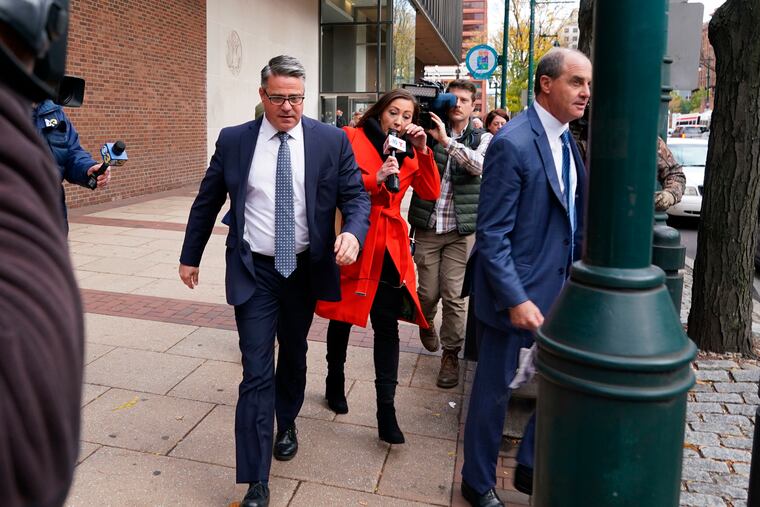With Henon’s resignation, a chance for Philly’s powerbrokers to move away from business as usual | Editorial
In deciding when and how the disgraced councilmember’s replacement is selected, Philly's political leaders have an opportunity to do things a different way.

It took much longer than it should have, but City Councilmember Bobby Henon has finally resigned.
Last November, Henon was convicted of bribery and honest services fraud alongside his political patron, John Dougherty — the former head of IBEW Local 98, the electricians’ union — in what one juror called “a real lesson in Philadelphia civics and how Philadelphia government works.”
Henon and Dougherty cast their legal fight as a David (pugnacious labor leader) vs. Goliath (politically motivated federal prosecutors) struggle and described their relationship as nothing out of the ordinary for a member of City Council and a union boss. But jurors, who in court heard one wiretap after another, disagreed.
Ultimately, the $70,000 a year Henon received from Local 98 proved hard to explain — especially when Henon, who said the sum represented his salary as an electrician, was unable to provide evidence of any electrical work that he performed.
» READ MORE: Bobby Henon should resign now | Editorial
We can only hope that Henon’s no-show electrician job will finally spur his former colleagues on Council to restrict outside employment for the members of that body going forward. With a salary of more than $130,000 per year, there is no need for councilmembers to risk the conflicts of interest that may come from moonlighting elsewhere.
Now comes the task of replacing Henon — and with it, a chance for Philadelphia’s political establishment to begin to change the way it does business.
Council President Darrell L. Clarke has the authority to schedule a special election to replace Henon, and the City Charter leaves the date up to his discretion. Of course, if Henon himself had done the right thing and stepped aside sooner, his replacement might already be in office and able to contribute to legislative matters like the redistricting debate.
While that possibility has been eliminated by Henon’s decision to hold onto his seat for two months after his conviction, Clarke can ensure that Henon’s constituents in the 6th District don’t go too long without representation. Although the Home Rule Charter allows for the Council president to choose when the special election happens, it’s key that Clarke prioritizes this measure by scheduling it on or before the May primary, instead of waiting for the general election.
» READ MORE: Philadelphia Politician Wall of Shame
It is also important that the process to find Henon’s successor offers more transparency than in prior special elections. Currently, the Democratic City Committee selects replacements by convening ward leaders, who, in the past, have sometimes chosen candidates from among their own ranks.
The opacity of the selection process concentrates the power to choose who represents the roughly 160,000 residents of Henon’s district into very few hands. The “endemic of insiderism,” as State Rep. Chris Rabb once dubbed special elections, can lead to corruption. Look no further than the embattled 190th District, where in 2021 the fourth state representative in three years was chosen by special election following resignations from Vanessa Lowery Brown, who stepped down after being charged with bribery, and Movita Johnson-Harrell, who left office after being charged with stealing more than $500,000 from a charity she founded.
It’s crucial that more voices be added to the conversation. One solution could be to include each elected committeeperson in the 6th District, not just the ward leaders, who oversee special elections (and who are not required by law to live within the district in question). Although still a part of the political machine, committeepersons are often on the ground in their neighborhoods and have a good sense of what their communities need most.
The Democratic City Committee grants broad autonomy to ward leaders in running special elections. It’s essential that these leaders expand the conversations about potential candidates to include committeepeople. While this may happen in an informal way now, codifying that kind of dialogue would ensure broader perspectives and strengthen the democratic process.
If Philadelphia is going to break the reputation for corruption we’ve earned after watching at least 20 elected officials get convicted of serious crimes in the last 40 years, transparency and collaboration are key. In deciding when and how Henon’s replacement is selected, city and political leaders have an opportunity to do things a different way. They should take it.